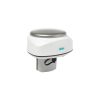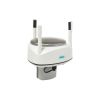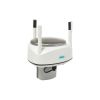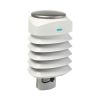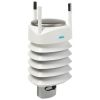Vaisala WXT534 Multi-Parameter Weather Sensor
Features
- Low power consumption is ideal for battery powered systems
- No moving parts for durability and long maintenance intervals
- Easy integration with 3rd party data collection platforms
- Free ground shipping
- Expedited repair and warranty service
- Lifetime technical support
- More
Flexibility
The Vaisala WXT530 series of weather instruments observe six of the most important weather parameters, which are air pressure, temperature, humidity, rainfall, wind speed and direction through various combinations. Select the transmitter with the needed parameter(s) for specific weather applications, with a large variety of digital communication modes and a wide range of voltages. There is a heated option available to keep sensors clear of snow and ice. Low power consumption enables solar panel applications. The Vaisala WXT530 Series focuses on maintenance-free operations in a cost-effective manner. The Vaisala WXT534 Multi-Parameter Weather Sensor simultaneously measures air temperature, humidity and pressure in a compact platform.
Integration
The series offers analog input options for additional third party analog sensors. With the help of the built in analog to digital converters, the Weather Transmitter WXT530 turns into a small, cost effective weather parameter hub. Additional parameters include the solar radiation and external temperature sensor. The analog mA output option for wind speed and direction enables a wide variety of industrial applications. The WXT530 exceeds IEC60945 maritime standard.
Solid Performance
Ultrasonic Vaisala WINDCAP Sensors are applied to determine horizontal wind speed and direction. Barometric pressure, temperature, and humidity measurements are combined in the PTU module using capacitive measurement for each parameter. The module is easy to change without making any contact with the sensors. The precipitation measurement is based on the unique acoustic Vaisala RAINCAP Sensor without flooding, clogging, wetting, and evaporation losses.
In The News
From Paddles to Phytoplankton: Studying Vermont’s Wildest Lakes
For six months of the year, Rachel Cray, a third-year PhD student at the Vermont Limnology Laboratory at the University of Vermont, lives between a microscope and her laptop, running data. For the other six months, she is hiking and canoeing four of Vermont’s lakes, collecting bi-weekly water samples. Cray studies algal phenology across four lakes in Vermont, US, that have low anthropogenic stress—or in other words, are very remote. Funded by the National Science Foundation Career Award to Dr. Mindy Morales, the lakes Cray researches part of the Vermont Sentinel Lakes Program, which studies 13 lakes in the area and, in turn, feeds into the Regional Monitoring Network, which operates in the Northeast and Midwest US.
Read MoreReimagining Water Filtration: How Monitoring and Science Enhance FloWater Filtration Systems
Over 50% of Americans think their tap water is unsafe , according to the Environmental Working Group (EWG). Other recent surveys have found that number to be as high as 70% of persons surveyed. Whether due to increased public awareness of water quality issues or confusion about how municipal water sources are regulated, there is a clear distrust of tap water in the United States. According to industry expert Rich Razgaitis, CEO and co-founder of the water purification company FloWater, this issue creates a damaging cycle. Razgaitis explained that the health and environmental problems associated with contaminated water aren’t the only issues. As people become increasingly aware that some tap water is unsafe, they resort to bottled water.
Read MoreMonitoring New Hampshire’s Aquatic Ecosystems: Continuous Data Collection in the Lamprey River Watershed
New Hampshire’s aquatic ecosystems provide a range of ecosystem services to the state and region. Resources and services like clean water, carbon storage, climate regulation, nutrient regulation, and opportunities for recreation all depend on New Hampshire’s aquatic ecosystems remaining healthy. Jody Potter, an analytical instrumentation scientist at the University of New Hampshire (UNH), is studying these aquatic ecosystems in hopes of developing an improved understanding of ecosystem services and their interactions with climate change, climate variability, and land use changes. [caption id="attachment_39799" align="alignnone" width="940"] Aquatic sensors in the Merrimack River in Bedford, NH, with I-293 in the background.
Read More













